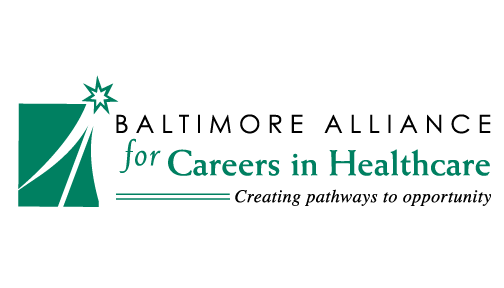Guide to Seeking a Career in Healthcare
Top Alliance Careers
In Baltimore, healthcare is the city's largest employment sector. But, like most urban centers throughout the country, there exists a critical shortage of qualified workers to fill positions such as nursing assistant, nurse extender, surgical technician, respiratory therapist, radiology technician, lab technician and pharmacy technician. The Alliance has worked with area hospitals, government agencies, schools and other healthcare organizations to address the shortage by developing career track guides called career maps that connect residents with career development opportunities and jobs.
The following careers have been identified by the Alliance as having the most critical need of Baltimore healthcare employers:
- Medical Laboratory Technician
- conducts routine laboratory tests for use in diagnosis and treatment of disease.
- Nursing Assistant
- performs delegated patient care functions of an uncomplicated nature under the supervision of a registered nurse.
- Nurse Extender
- nursing assistants who have received additional training in IV starts, EKGs, Foley catheters, blood drawing, oxygen therapy, NG tubes, suctioning, drain management and wound care and perform these functions under the supervision of a registered nurse.
- Pharmacy Technician
- prepares, packages, distributes and delivers medications under the supervision of a pharmacist.
Education Partners and Resources
- Baltimore City Community College
- Community Colleges of Baltimore County
- Stevenson University
- Baltimore Mayor's Office of Employment Development
- Baltimore City Public School System
- How to Get a GED in Maryland
- Job Opportunities Task Force
- Maryland Association of Community Colleges
- Maryland Health Careers
- Maryland Higher Education Commission
- Maryland Hospital Association
- Maryland State Department of Education
- Student Financial Assistance
- Online Scholarship Search
Career Maps
Virtually anyone can benefit from career mapping. Whether you have not yet attained a high school diploma or GED or if you are a college graduate, career maps can provide a pathway to rewarding careers in the health professions. Even if you are already employed and want to advance or move into another healthcare occupation, mapping will give you the basics job duties, rate of pay, education and experience required.
